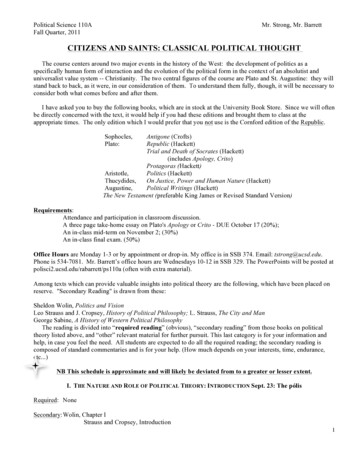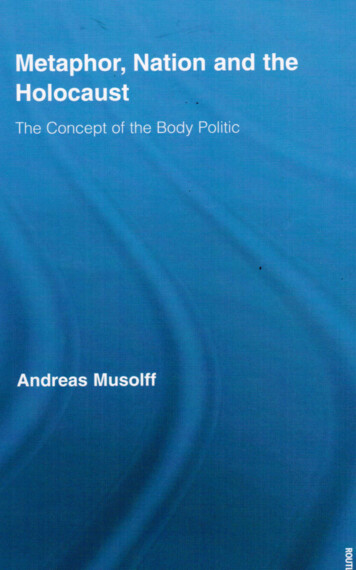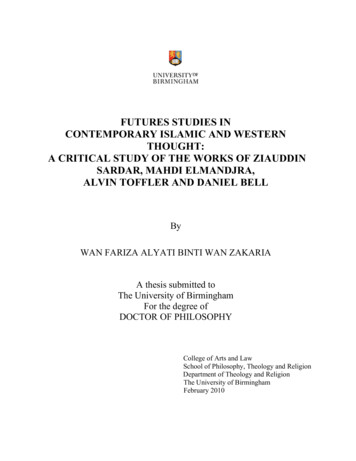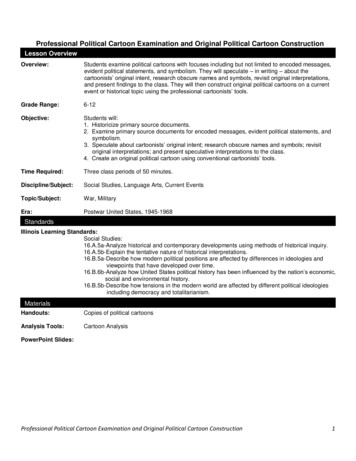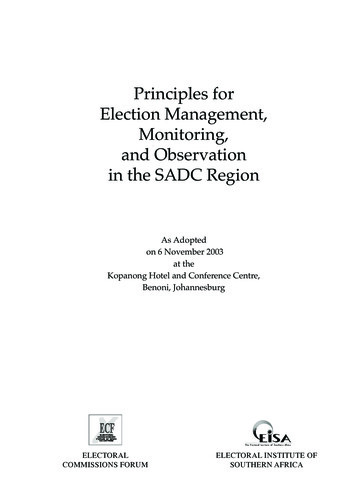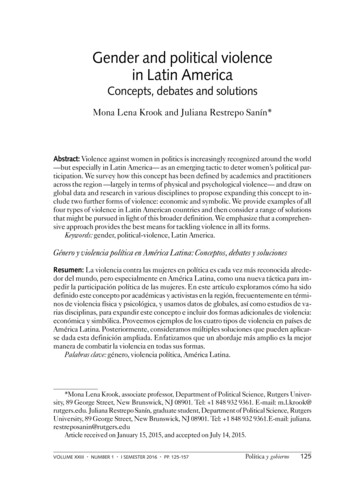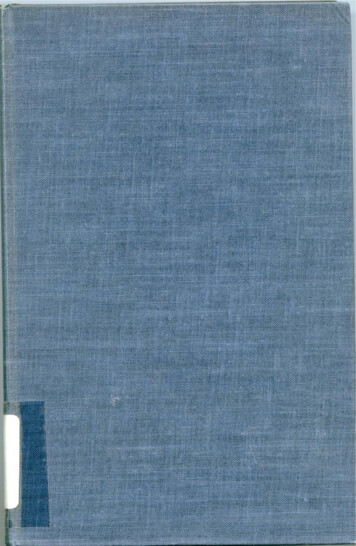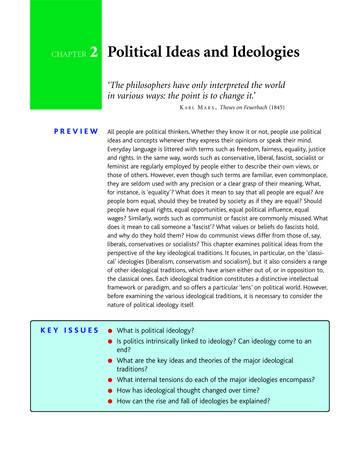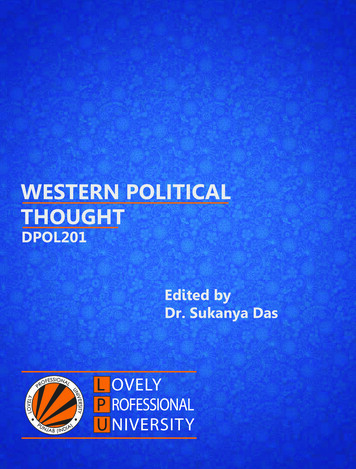
Transcription
WESTERN POLITICALTHOUGHTDPOL201Edited byDr. Sukanya Das
WESTERN POLITICAL THOUGHTEdited By:Dr. Sukanya Das
Printed byUSI PUBLICATIONS2/31, Nehru Enclave, Kalkaji Ext.,New Delhi-110019forDirectorate of Distance EducationLovely Professional UniversityPhagwara
SYLLABUSWestern Political ThoughtObjectives1. This paper studies the classical tradition in political theory from Plato to Rawls with the view to understand how the greatMasters explained and analyzed political events and problems of their time and prescribed solutions.2. The paper aims at the comparison of the ideas of different Political philosophers and theorists.3. The legacy of the thinkers is explained with a view to establish the continuity and change within the Western politicaltradition.Sr. No.Description1Plato: Republic, ideal state: theory of justice, communism, education2Aristotle: Organic theory of state, classification of states, theory of revolution3Niccolo Machiavelli: Separation of ethics from politics, State craft4Thomas Hobbes: Individualism, social contract5John Locke: State of nature and Natural rights and property, Social contract theory6Jean-Jacques Rousseau: Human nature, social contract, general will7Jeremy Bentham: Utilitarianism, theory of state and government8Friedrich Hegel: Dialectics, theory of state and freedom9Karl Marx: Historical materialism and class struggle, Dialectical materialism, Theory of surplus value10John Stuart Mill: Theory of liberty, representative government
CONTENTUnit 1:Plato’s Life, His Ideal State and Theory of Justice1Sukanya Das, Lovely Professional UniversityUnit 2:Plato’s Communism and Theory of Education14Rosy Hastir, Lovely Professional UniversityUnit 3:Aristotle’s Life and His Conception of Human Natureand State27Sukanya Das, Lovely Professional UniversityRipudaman Singh, Lovely Professional UniversityUnit 4:Aristotle’s Theory of Revolution42Sukanya Das, Lovely Professional UniversityAmandeep Singh, Lovely Professional UniversityUnit 5:Niccolo Machiavelli65Rosy Hastir, Lovely Professional UniversityAmandeep Singh, Lovely Professional UniversityUnit 6:Thomas Hobbes87Rosy Hastir, Lovely Professional UniversityAmandeep Singh, Lovely Professional UniversityUnit 7:John Locke106Sukanya Das, Lovely Professional UniversityAmandeep Singh, Lovely Professional UniversityUnit 8:Jean Jacques Rousseau127Rosy Hastir, Lovely Professional UniversityAmandeep Singh, Lovely Professional UniversityUnit 9:Jeremy Bentham149Sukanya Das, Lovely Professional UniversityJyoti, Lovely Professional UniversityUnit 10: George Wilhelm Friedrich Hegel173Sukanya Das, Lovely Professional UniversityKirandeep Singh, Lovely Professional UniversityUnit 11: Karl Marx: His Life and Works, Materialism andDialectical MaterialismSukanya Das, Lovely Professional UniversityKirandeep Singh, Lovely Professional University197
Unit 12: Karl Marx: Class Struggle and Social Change and Theoryof Surplus Value213Sukanya Das, Lovely Professional UniversityKirandeep Singh, Lovely Professional UniversityUnit 13: John Stuart Mill’s His Life and Theory of Liberty234Sukanya Das, Lovely Professional UniversityManu Sharma, Lovely Professional UniversityUnit 14: John Stuart Mill Representative GovernmentSukanya Das, Lovely Professional UniversityManu Sharma, Lovely Professional University250
Sukanya Das, Lovely Professional UniversityUnit 1: Plato’s Life, His Ideal State and Theory of JusticeUnit 1: Plato’s Life, His Ideal State and Theory of JusticeNotesCONTENTSObjectivesIntroduction1.1 Life Sketch1.2 The Republic1.3 Ideal State1.4 Theory of Justice1.5 Summary1.6 Key-Words1.7 Review Questions1.8 Further ReadingsObjectivesAfter studying this unit students will be able to: Know about the Republic Understand Plato’s Ideal State Evaluate Plato’s Theory of Justice.IntroductionIn the history of political thought no thinker evoked the admiration, reverence and criticism thatPlato (428/27-347 BC) did. This outstanding Greek philosopher has left behind many importantworks, out of which three, the Republic, (380-370 BC), the Statesman (360 BC) and the Laws (350 BC),are of perennial interest to all those interested in the history of political ideas. Plato has beengenerally regarded as the founder of philosophical idealism by virtue of his conviction that thereis a universal idea in the world of eternal reality beyond the world of the senses. He was the firstto formulate and define political ideas within a larger framework of a philosophical idea of Good.He was concerned about. human life and human soul or human nature, and the real question in it is as Platosays, how to live best . what is the best life?. is to him inseparable from the question,what is [the] best order or organization of human society (Nettleship 1967: 5).Plato perceived political philosophy as an architectonic science of society, and like Socrates (469399 BC) and the Sophists, distinguished the political from the other dimensions of life. Within theEuropean intellectual tradition he conceptualized the disorders and crises of the actual world andpresented to his readers a vision of a desirable political order, which till today fascinates hisadmirers and detractors. He has been described as a poet of ideas, a philosopher of beauty and thetrue founder of the cult of harmonious living. He has been praised for his denunciation of crassmaterialism and brutish selfishness. Both Francois-Marie Arouet Voltaire (1694-1778) and FriedrichWilhelm Nietzsche (1844-1900) characterized Platonism as the intellectual side of Christianity(1955). Many like John Ruskin (1819-1900) and William Morris (1834-1896) were attracted byPlato’s concern for human perfection and excellence. Ralph Waldo Emerson (1803-1882) exclaimedecstaticallyLOVELY PROFESSIONAL UNIVERSITY1
Western Political ThoughtNotesPlato is philosophy and philosophy is Plato for out of Plato comes all things that arestill written and debated among men of thought . . Burn the libraries for their valuein this book.Plato has been credited for laying the foundations of Greek political theory, as he explored,analyzed and covered a wide range of philosophical perspectives and issues, on which the Westernpolitical tradition rests. Aristotle, a critic of Platonic ideas in the Republic, rejected many of them,but extends Plato’s formulation in the Laws. It is for this reason that Whitehead, paying the mostfitting tribute to Plato stated that the entire European philosophical tradition is nothing but a setof footnotes to Plato.While Plato’s admirers have been numerous, he has had his share of critics too, beginning withAristotle. Most of his recent critics have been in the twentieth century within the liberal tradition.They assailed Plato for his hostility towards progressive, humanitarian and democratic ideals,and regarded him as the philosophical forerunner of modern day totalitarianism, which itself is atwentieth century phenomenon. Paradoxically, the liberals in the nineteenth century were moreappreciative of Plato, claiming him to be a liberal of that period.1.1 Life SketchPlato was born in May-June 428/27 BC in Athens in a distinguished, aristocratic, though notaffluent, family. His father, Ariston, traced his ancestry to the early kings of Athens, even toPoseidon, the God of the Sea. His mother, Perictione, was a descendant of Solon (640-559 BC), thefamous lawgiver of Athens. Perictione’s brother Charmides and uncle Critias were among the 30tyrants who ruled Athens after its defeat in the Peloponnesian War (431-404 BC). Plato had onesister (Potone), two brothers (Adeimantus and Glaucon), and one half-brother (Antiphon).He was known for his good looks and charming disposition. He excelled in the study of music,mathematics, poetry and rhetoric. He fought in three wars and won an award for bravery. Henever married.It was natural that the trial and execution of Socrates in 399 BC proved to be a turning point inPlato’s life. The last discussion that Socrates held was immortalized in Crito. Plato could not attendthe discussion on account of illness. It should be noted that Socrates was not the only one to beexecuted. There were others too. Both Anaxagoras (500-432 BC) and Protagoras (481-411 BC) werebanished from Athens, and subsequently Aristotle too would have met a similar fate had he notgone into exile.Plato met Socrates in 407 BC at the age of 20 and since then was under his “hypnoticspell”. So decisive and persuasive was the influence that he abandoned the idea ofbecoming a poet.In 404 BC Athens witnessed an oligarchic revolution led by Plato’s relatives. At this time Platotook an active part in politics, from which he withdrew later following the restoration of democracy,the death of Critias and Charmides, and the execution of Socrates. He left Athens and fled toMegara, where he took refuge with Euclid (300-260 BC), the renowned geometrician. From Megarahe went to Egypt to study mathematics and the historical traditions of the priests. He returned toAthens in 395 BC and for the next few years fought for the city of Corinth. In 387 BC he visited thePythagorean philosopher, mathematician and political leader Archytas at Taras in the south of Italy.2LOVELY PROFESSIONAL UNIVERSITY
Unit 1: Plato’s Life, His Ideal State and Theory of JusticeNotesPlato’s real name was Aristocles, which meant the “best and renowned”. He wasgiven the nickname “Plato”, derived from platys, because of his broad and strongshoulders.In 386 BC, on returning to Athens, Plato’s friends gifted him a recreation spot named after its localhero Academus, or Hecademus. It was here that Plato established his Academy, which became aseat of higher learning and intellectual pursuits in Greece for the next one hundred years. Theacademy was not the first of its kind, for there were others, like the Pythagorean school of Crotonaestablished in 520 BC and the School of Isocrates in 392 BC, but it was perhaps the most wellknown.The Academy was initially a religious group dedicated to the worship of Muses and its leaderApollo. The academy, like the Pythagorean School admitted women. Mathematics which includedarithmetic and advanced geometry, astronomy, music, law, and philosophy were the main subjectsfor study. The importance of mathematics was clear from the inscription at the portals of theacademy, “medeis ageometrtos eisito”, or “let no one without geometry enter here”. “It isnoteworthy that modern Platonists, with few exceptions are ignorant of mathematics, in spite ofthe immense importance Plato attached to arithmetic and geometry, and the immense influencethey had on his philosophy”. The close link between mathematics and philosophy that Platobegan was followed by others, like Hobbes and Jeremy Bentham (1748-1832).The Academy concretized the possibility of a science of knowledge with which one could reformthe world. Plato saw in the academy a training school for future philosophic rulers. The Republic,composed at this time, served as its prospectus. Teaching in the Academy was imparted throughlectures, Socratic dialectics and problem-solving situations. For Plato, the search for truth was notthrough mere instruction and theoretical knowledge, but with the guidance of an advanced mind.Through the academy, Plato kept alive the Socratic legacy. In course of time the Academy alsobecame the prototype for subsequent universities and institutions of higher learning.The founding of the Academy is a turning point in Plato’s life and in some ways themost memorable event in the history of European science. It was the culmination ofhis efforts. It was a permanent institution for the pursuit of science by original research.Plato devoted the bulk of his time and energies in organizing and managing the Academy. In 367BC he visited Sicily on the invitation of Dion in order to make the late king Dionysius’ nephewand heir, Dionysius II, a philosopher king. However, Dionysius resented Plato’s assertion thatgeometry held the key to statecraft, forcing Plato to return home. In 361 BC Plato made anothervisit, with a view to securing the recall of Dion, now in exile, and to bring about reconciliationbetween Dion and Dionysius II. Plato was sold as a slave and was released only after the paymentof a ransom.Plato spent the last years of his life at the Academy, teaching and instructing. He died in 347 BCwhile attending the wedding feast of one of his students. As merry making continued past midnight,Plato decided to catch up with some sleep, retiring to a corner in the house, never to wake up. Inthe morning the revellers realized that he had died. On hearing the news of his death, the wholeof Athens came to pay respects to one of its most distinguished and erudite citizens.1.2 The RepublicThe Republic is the greatest and most well-known work of Plato. It was written in the form of adialogue, a method of great importance in clarifying questions and establishing truth. It was oneof the finest examples of the dialectical method as stated and first developed by Socrates. ThoughLOVELY PROFESSIONAL UNIVERSITY3
Western Political ThoughtNotesSocrates did not provide a theoretical exposition of the method, he established a clear-cut patternof dialectical reasoning for others to follow. He placed dialectics in the service of ethics, definingvirtue as a basis for rational and moral transformation. He used the method to secure answersabout human beings and society, and not nature. “Political philosophy emerged by way of anethical question which nature could never answer; the problems of men were not strictlycoterminous with the problems of nature” (Wolin 1960: 30).The discussions in the Republic were conducted in a single room among Socrates, Cephalus andhis son Polemarchus, Thrasymachus, Glaucon and Adeimantus. Cephalus, Polemarchus andThrasymachus appeared in Book I, while the discussion in the later books was carried on bySocrates and Plato’s two brothers. In fact, Socrates was the main spokesman.The Republic in Greek meant “justice”, and should not be understood in its Latin sense meaning“the state or the polity”. It began with the quest of understanding the Idea of Good, and explainedhow a perfect soul could be developed. Its core has been succinctly summarized as follows.Philosophy meant to him what it meant to his master. The Socratic philosophy, analyzedand formulated in the early dialogues, was not the study of nature or logic ormetaphysics; it was the pursuit of wisdom, and to achieve wisdom would be to achievehuman perfection, well being and happiness. This again meant not merely “caring forone’s own soul” as an isolated individual, saving himself and leaving society to itsfate. Human excellence, as Plato and Aristotle after him always maintained, is theexcellence of an essentially social creature, a citizen. To produce this experience andconsequent well being is the true end of the “Royal Art” of statesmanship. Hence thelife of philosophy and the life of the active statesman ought not to be, as they appearedto Callicles, alternative careers, but a single life in which all the highest powers of manwould find full expression. Society could be saved only by reuniting the two elementswhich had been drifting apart.The book explored the notion of justice and its realization within the individual and the state. Itsketched a detailed picture of the polity and social institutions, with a view to attaining humanexcellence and perfection. It had an elaborate scheme of education, which led Rousseau to commentthat it was hardly a political work, but the finest treatise on education ever written. It contained adetailed examination of the meaning of good life and outlined the means to achieve it.In the repuhblic practically every side of Plato’s philosophy is touched upon ordeveloped, and its range of subject matter is such that it may be said to deal with thewhole of human life. It has to do with the good man and the good life, which for Platoconnoted life in a good state, and with the means for knowing what they are and forattaining them. And to a problem so general no side of individual or social activity isalien. Hence the Republic is not a treatise of any sort, nor does it belong to politics, orethics, or economics, or psychology, though it includes all these, and more, for art andeducation and philosophy are not excluded.The Republic is a book which defies classification. It fits into none of the categories eitherof modern social studies or of modern social science.1.3 Ideal StateIn recent years, there have been doubts about Plato’s seriousness in implementing the Ideal State.Strauss (1964) considered the Republic as the greatest critique of idealism ever written. It was asatire written with the purpose of demonstrating the limits of what was politically feasible. This4LOVELY PROFESSIONAL UNIVERSITY
Unit 1: Plato’s Life, His Ideal State and Theory of Justicewas because the ideal state was unrealistic and unrealizable, for the philosopher was not a naturalruler and governing was thrust upon him in the larger interest of the community. Therefore“. the Republic conveys the broadest and deepest analysis of political idealism ever made”.NotesRandall (1970: 116-165) pointed out that the Republic was a comic irony written with the purposeof demonstrating that the Spartan model was absurd and unworkable. Bloom (1968), agreeingwith Strauss, contended that:Political idealism is the most destructive of human passions and the Republic is the greatest critiqueof political idealism ever written . The Republic serves to moderate the extreme passion for justiceby showing the limits of what can be demanded and expected of the city (Bloom ibid: 408-410).Strauss and Bloom asserted that Plato did not show a relationship between the two aspects ofjustice, namely psychic harmony and happiness (eudaemonia), at least in the case of the philosopherruler. There was no proof that ruling would promote the happiness of the philosopher ruler, norwere there compelling and convincing reasons for the philosopher to renounce a life ofcontemplation and take to ruling. They challenged the traditional viewpoint of Barker (1964: 277284), Cassirer (1946: 70-73), Cornford (1945: xxxv), Nettleship (1967: 211-215), Sabine (1973: 51-56)and Sinclair (1951: 57-59) which contended that the philosopher ruled out of a sense of duty to dogood to others, and regarding the good of others as extended self-interest.Sabine, explaining further, pointed out that Plato made two fundamental assumptions which wereinterrelated. These were: (a) that government ought to be an art depending on exact knowledge;and (b) that society existed for the mutual satisfaction of needs by persons whose capacitiessupplement one another. While the first was intrinsic to human personality, the second referred toeducation and experience. In view of these two assumptions, Plato was convinced that if rulingwas entrusted to experts who could be trained, then governance would be above mediocrity andexpediency. Political leadership was both an art and a science. Good governance would confer adynasty of political rulers who could meet every contingency, rather than have occasional premiersof the people. It would eliminate factionalism and petty groupism in politics. Ruling, for Plato,had to be in accordance with the true dictates of moulding and transforming the state andindividuals in light of an absolute standard. Political philosophy had to prevent incompetenceand knavery in public life. The philosophers’ vision of the Forms and Good was a moralizingexperience, and that explained their commitment to the Ideal State of which they were the architects.It supplied the state with an active probing critical intelligence. For Plato every individual had asocial side. Besides ensuring his own good, a philosopher must also be useful to society, for it wasonly within a society that an individual realized his true self. The philosophers ruled in order toprevent victimization at the hands of inferior rulers.1.4 Theory of JusticeOne of the most fundamental ethical and political concepts is justice. It is a complex and ambiguousconcept. It may refer to individual virtue, the order of society, as well as individual rights iscontrast to the claims of the general social order.An ideal state for Plato possessed the four cardinal virtues of wisdom, courage, temperance orself-control and justice. It would have wisdom because its rulers were persons of knowledge,courage because its warriors were brave, self-control because of the harmony that pervaded thesocietal matrix due to a common agreement as to who ought to rule, and finally, justice of doingone’s job for which one was naturally fitted without interfering with other people. For Plato, thestate was the Ideal, of which justice was the reality. Justice was the principle on which the statehad to be founded and a contribution made towards the excellence of the city.The central question of the Republic was the meaning of justice or right conduct or morality. It didnot refer to legality. Plato critically examined contemporary views on justice and then defined theLOVELY PROFESSIONAL UNIVERSITY5
Western Political ThoughtNotesconcept. Subsequently, he elaborated the application of the concept and its realization within anindividual and the state. Justice in the individual was defined analogously to justice in the state.Different Definitions of JusticeThe text opens with a discussion between Socrates and Cephalus on the subject of old age andwealth. Cephalus, old and prosperous, pointed out that wealth by itself did not make one happy,but provided comforts that made life easy. It enabled one to lead a good life and to do what wasmorally right. Cephalus defined justice as telling the truth, being honest in word and deed andpaying one’s debts.Socrates dismissed the argument effortlessly by pointing out that in some cases it might be harmfulto speak the truth or return one’s belongings, through examples like returning weapons to a madperson, or telling the truth when it was better to conceal it. He did not show that honesty in wordand deed was not justice, but rather that such honesty could be harmful. Since all his listenerstacitly accepted the (unstated) argument that justice had to be beneficial, or at least not harmful, hewas able to persuade them that Cephalus’ view would not be acceptable.At this point, Cephalus gave up, but the argument was continued by his son Polemarchus. Byaltering the definition provided by Cephalus, Polemarchus pointed out that justice meant “givingeach man his due” or “what was fitting”. In short, justice was “doing the right thing”, which hequalified to mean doing “good to friends and harm to enemies”. Polemarchus reiterated an acceptablepart of Greek morality as evident from Solon’s prayer, “May I be pleasant to my friends, hateful tomy enemies”, though this certainly contradicted the teaching in the Sermon on the Mount.With the help of three arguments, Socrates demolished the views of Polemarchus. First, helpingfriends might also involve ignoble acts like stealing and telling a lie. Second, the idea of beinggood to friends and bad to enemies was difficult to apply, because a person could make mistakesabout one’s friends and enemies. A supposed friend might not actually be a friend in reality.Moreover, a person who could do the maximum help could also do the maximum harm. Third, ajust person should not harm anyone because those who get injured become even more unjust.Justice was human excellence, and a just person could not harm anybody, including the self. Onceagain, Socrates did not disprove the concept, but only its application. He merely persuadedPolemarchus to accept what he was saying. Polemarchus could have retorted that spanking achild or a pet dog might not be harmful (from which he refrained, perhaps out of civility). In fact,nowhere did Socrates provide a proper and clear description of Good.The discussions continued with an interjection from Thrasymachus, a Sophist. After making surethat he would be paid a fee, he agreed and defined justice or right as the interests of the strongerparty, namely the ruler. While the strong made all the rules, the weak—the subjects—merelyobeyed them. Thrasymachus explained his notion as follows:Each type of government enacts laws that are in its own interest, a democracy democraticlaws, a tyranny tyrannical ones and so on; and in enacting these laws they make itquite plain that what is “right” for their subjects is what is in the interest of themselves,the rulers, and if anyone deviates from this he is punished as a lawbreaker and“wrongdoer”. That is what I mean when I say that “right” is the same thing in allstates, namely the interest of the established government; and government is thestrongest element in each state, and so if we argue correctly we see that “right” isalways the same, the interest of the stronger party.Socrates responded by pointing out that rulers might make mistakes by not being able to identifytheir interests and frame laws contrary to their advantage, thus putting Thrasymachus in a toughspot. Instead of following Clitophon’s advice to redefine justice as “whatever the strong believe tobe in their interest”, Thrasymachus made things difficult by charging off in the wrong direction.He replied that rulers by definition could not make mistakes, and if they did so they could no6LOVELY PROFESSIONAL UNIVERSITY
Unit 1: Plato’s Life, His Ideal State and Theory of Justicelonger remain rulers. He asserted that an unjust life was stronger and better than a just one.Thrasymachus conceded that justice ought not to be in the interest of the stronger, but that was thenormal practice and there were plenty of examples to substantiate it.NotesThrough a series of analogies, Socrates showed that justice was not the advantage of the stronger,for the ruler’s duty was to serve the interests of the people. A ruler’s position was similar to thatof a doctor, teacher or shepherd. Any art, which included ruling, should be for the welfare of theobject, and not the subject.By defining justice as the interest of the stronger, Thrasymachus earned a place in the history ofpolitical theory. The fact that Socrates was unable to refute the argument was perhaps anacknowledgement of the fact that it was the strongest who set the standards in society.Glaucon and Adeimantus were still unconvinced with the arguments furnished by Socrates on thecauses of injustice. They argued that individuals were not willingly just, but only out of necessity,in which case injustice was better than justice. Glaucon pointed out that all customary rulesrelating to religion and morality were imposed on individuals by social sanction, which originatedin human intelligence and will. They were based on a tacit consent of the parties. These wereconventions which could be altered, changed or repealed by legislative bodies. A law emergedwhereby the strong and the weak contract with each other; the strong agreed not to inflict wrong,and the weak accepted not to suffer injustice.Adeimantus, extending Glaucon’s argument, pointed out that existing religious values andeducation taught the young that injustice was good because of the rewards it brought, thusconvincing them that the ideal would be injustice clothed in good reputation. Thus, while“Thrasymachus concentrated on the role of power in defining values, Glaucon was concerned toemphasize the importance of law in any consideration of justice”.Both Glaucon and Adeimantus challenged Socrates to show that justice was intrinsicallygood and reflected an inward quality of the soul, rather than the rewards and goodreputation it brought.At this point Socrates became more constructive, and replied with the help of examples. Using themethod of large letters, he said that anything written in big and bold, in contrast to somethingwritten in a small size, would receive more attention. Similarly, in order to understand the meaningof justice, one could see its application at the level of the state and then in the individual. BothGlaucon and Adeimantus agreed with this suggestion.Justice in the State and IndividualSocrates examined the origin of states and cities, and pointed out that they arose out of tworeasons. The first was mutual need, and the second, the differences in aptitudes of individuals.Mutual need led to reciprocal services, since the individual was not self-sufficient and dependedon others for subsistence. Exchange of services necessitated division of labour and functionalspecialization, which was possible since individuals differed in their nature and aptitudes.Individuals could be trained to specialize and perform one particular task. Specialization wasencouraged to bring about excellence and perfection. It was not to assign any kind of superiorityor snobbery to one particular function. It was essentially to recognize and bring to fruition theuniqueness in every individual. Acceptance and organization of diverse human aptitudes wouldresult in social benefit, cooperation and harmony.LOVELY PROFESSIONAL UNIVERSITY7
Western Political ThoughtNotesPlato made two important points here. The first was that every individual was a functional unit,assigned a particular task with clear-cut obligations and privileges, which one was expected toperform diligently and meticulously. It also underlined the fact that none were born to render aspecific function. Certain levels of training and skills were required. Moreover, since everybodywould be involved in the performance of a socially required function, it would minimize, if notaltogether eliminate, the probability of being a free rider or a shirker. Second, society was visualizedas a harmonized, orderly whole, based on the recognition of individual talents and contributions.The functions of a society were broadly three—ruling, defence and production. The last oneincluded all kinds of trades and crafts.Plato was the f
1. This paper studies the classical tradition in political theory from Plato to Rawls with the view to understand how the great Masters explained and analyzed political events and problems of their time and prescribed solutions. 2. The paper aims at the comparison of the id
